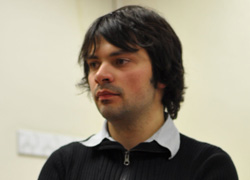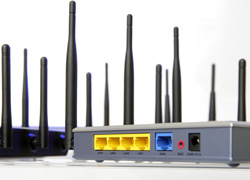IMDEA Networks

Archives: Events
A SOFT Way for OpenFlow Switch Interoperability Testing
The increasing adoption of Software Defined Networking, and OpenFlow in particular, brings great hope for increasing extensibility and lowering costs of deploying new network functionality. A key component in these networks is the OpenFlow agent, a piece of software that a switch runs to enable remote programmatic access to its forwarding tables. While testing high-level network functionality, the correct behavior and interoperability of any OpenFlow agent are taken for granted. However, existing tools for testing agents are not exhaustive nor systematic, and only check that the agent’s basic functionality works. In addition, the rapidly changing and sometimes vague OpenFlow specifications can result in multiple implementations that behave differently.
Read more arrow_right_altMobile Communications Networks: Evolving through Biologically-Inspired Technologies
Mobile communications networks have been evolved through multiple technologies over a period of several decades, to a stage that they become very complicated in the context of resource control and management. The heterogeneous next generation mobile network (NGMN) now includes a variety of network technologies and topologies incorporating with one another to provide a wide range of services; operate in a variety of channel conditions and environments; and within a single universal end user device. NGMN will need to be offered as an integrated system, and to promote interoperability among networks, offer global coverage and seamless mobility, enable the use of a universal handheld terminal, and enhance service quality compared to current wired networks. NGMN will be the infrastructure of the true mobile Internet.
Read more arrow_right_altLow cost Network Coding for Collaborative Video Streaming
We focus on collaborative video streaming in wired overlay networks using low cost network codes. We propose a scheme that builds on both rateless codes and network coding in order to improve the system throughput and the video quality at clients. Our hybrid coding algorithm permits to efficiently exploit the available source and path diversity, without the need either for expensive routing or for scheduling algorithms.
Read more arrow_right_alt4GSensor, Paradigms for the Next Generation Wireless Sensor Networks
If you would like more information about Dr. Tiago Camilo, please visit his Linkedin profile: http://www.linkedin.com/in/tiagocamilo
More information about Nokia Siemens Networks
Read more arrow_right_altScience is my Life
Under the title La Ciencia es mi Vida (Science is My Life), a roundtable will be held between 19:00 and 21:00 of Friday 28th September 2012 in the Residencia de Estudiantes de Madrid (street Pinar 21-23), moderated by the Professor of Theoretical Physics Mr. Alfredo Poves, gathering a number of researchers from the Madrid Institutes of Advanced Studies (IMDEA, Institutos Madrileños de Estudios Avanzados).
Read more arrow_right_altESNOG/GORE 2012 - Networking event
On Wednesday, the 13th of November, will take place the next meeting of ESNOG/GORE (España Network Operators Group / Grupo de Operadores de Red Españoles), at the Polytechnic School (Leganés Campus) of the University Carlos III of Madrid (UC3M). The meeting is sponsored by the Cátedra Telefónica de la UC3M and ESPANIX (Punto neutro Español de Internet). This is a workshop that will schedule a series of lectures and panel discussions on Internet at the network level.
Read more arrow_right_altSeminar: Peer-to-peer vs. IP multicast: comparing approaches to IPTV streaming based on TV channel popularity
Already a popular application in the Internet, IPTV is becoming, among the service providers, a preferred alternative to conventional Broadcasting technologies. Since many of the existing deployments have been done within the safe harbor of telcos own networks, IP multicast has been the desired streaming solution. However, previous studies showed that the popularity of the TV channels follows the Pareto principle, with the bulk of TV channels being watched only by a small fraction of viewers. Recognizing the potential scalability issues, we believe that multicast streaming approach may not be desirable for unpopular TV channels, especially when there are many such channels in the provider's service package.
Read more arrow_right_altAdvanced Computer Networks
This seminar builds on your basic knowledge of computer networks from an introductory computer networks class or equivalent. It covers mathematical and algorithmic foundations of the essential networking functions of data transfer, transfer control, and management. Essential concepts of some techniques, such as optimization, control theory, queuing theory, and their application to networks are covered.
Read more arrow_right_altNetworked 3-D Virtual Collaboration in Science and Education: Towards ‘Web 3.0’ (A Modeling Perspective)
Combined advances in high speed networking, mobile devices, application sharing, web services, virtual world technologies and large scale event processing are converging to create a new world of pervasive, ubiquitous “presence” of users, which offers tremendous potential for social interaction and co-creation. The communication networking and computing requirements of this converged human-centric environment are also increasing at an accelerated pace. In this new environment, it is imperative that the much-needed networking and computing resources align closely with the needs and patterns dictated by the applications, social networks, and by the human users. We believe that the success of such socio-technical systems will hinge on the way networks capture and interact with human presence and location, in all of its physical, virtual and perceived aspects.
Read more arrow_right_altRouting and capacity resilient network design
Despite the broadly title, the seminar will be focused in the notion of max-min fairness (MMF) and its application to routing optimization in communication networks:
1. Basic notions
2. Convex MMF problems
3. Non-convex MMF problems
4. Examples of MMF routing optimization problems












Recent Comments